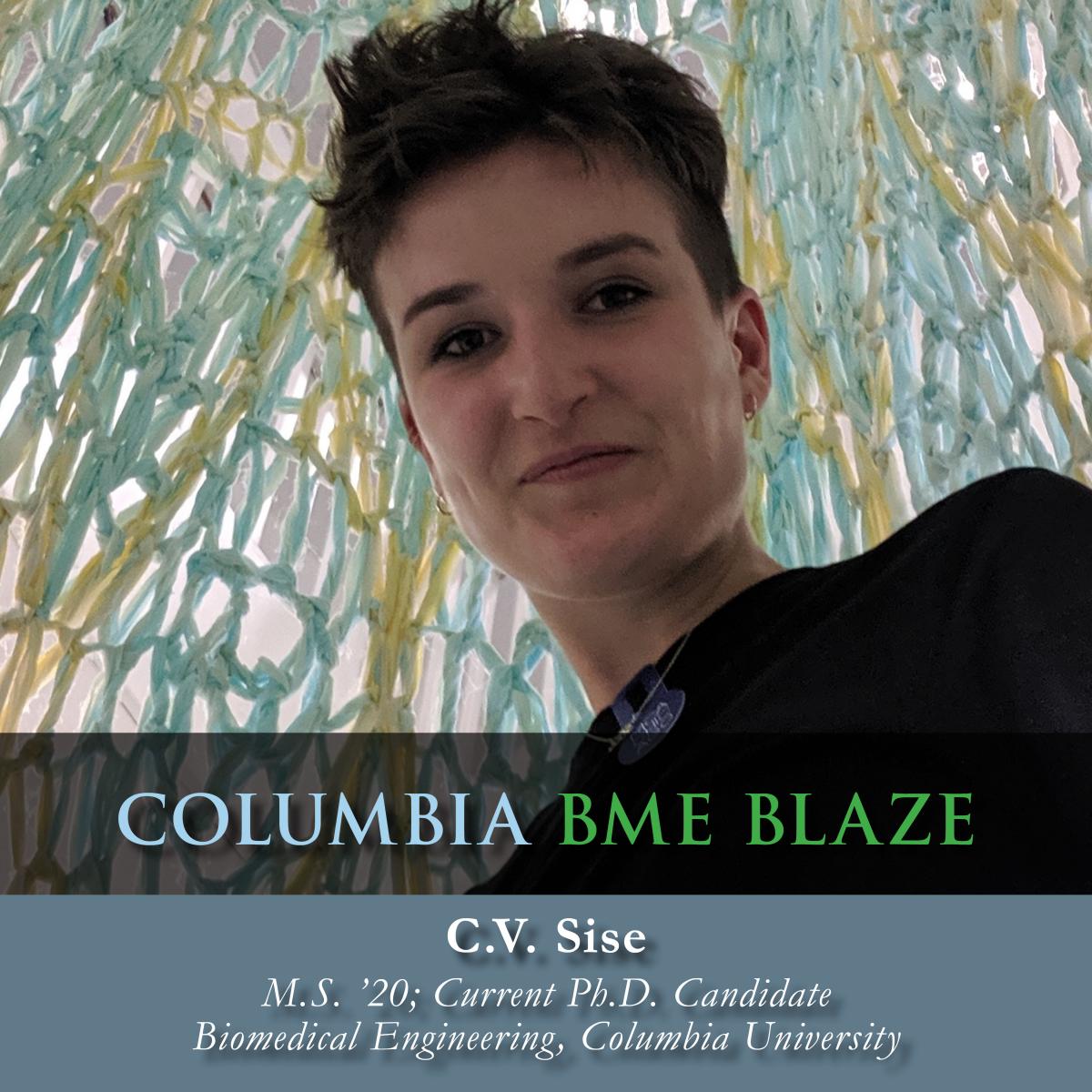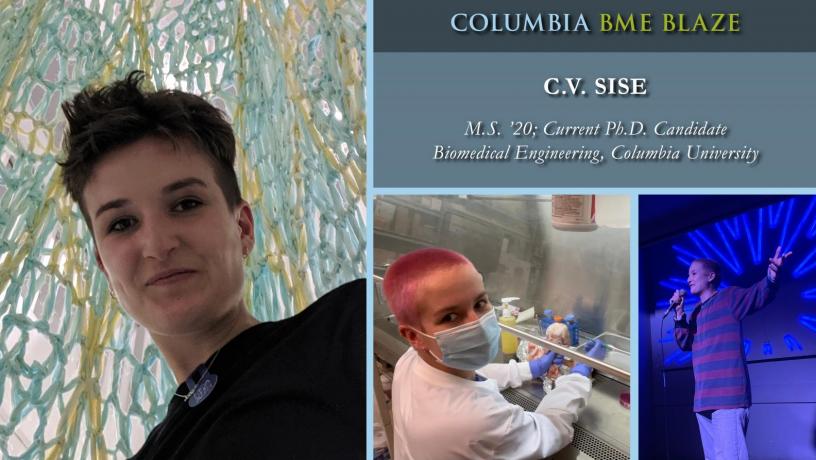June 2022 - BME Blaze: C.V. Sise
In this monthly spotlight, get to know the alumni and students of Columbia's Department of Biomedical Engineering. Read what our BME folks are up to, from our labs' latest research, to our students' plans for the future, to our teams' innovations, start-ups and other career successes.
In this special Pride Month edition of our BME BLAZE inerview, we loved catching up with Columbia BME PhD candidate C.V. Sise, as C.V. discussed their experience as a Columbia BME grad student, and told us about what Pride Month means to them. Read below to get to know C.V.!

C.V. Sise
Education
- Sc.B. – Biomedical Engineering, 2018, Brown University
- M.S. – Biomedical Engineering, 2020, Columbia University
- M.Phil. – Biomedical Engineering, 2022, Columbia University
- Ph.D. Candidate in Biomedical Engineering at Columbia University
Where are you from?
Upstate New York
What drew you to the field of Biomedical Engineering?
At the beginning of undergrad, I chose to study Biomedical Engineering because I wanted to take a wide variety of science classes across disciplines. What started out as an indecisiveness grew into a love for studying how the body works.
Tell us about your experience at Columbia University.
My experience at Columbia has been largely defined by the people within my department. I’ve gained many friends and collaborators through my fellow PhD students, and have been grateful to get to know many professors within the department.
Why did you choose Columbia BME?
When choosing among programs, it was important to me to study in a city, so I could find community outside of my workplace. I also do standup comedy in my free time, and NYC has a lot of opportunities for comedians. Most importantly, I work in orthopedics, and Columbia has an impressive presence within the field.
What are some of your favorite projects/memories from the program so far?
My favorite project has also been my main area of research which is working with a femtosecond laser to treat osteoarthritic cartilage. I came to Columbia with no experience in optics or light-tissue interaction, and have been able to take advantage of classes offered by the Physics department to boost my knowledge of the field.
My favorite memories at Columbia have been the late night studying I would do with my friend in my cohort during my first two years. I also have loved the many department events, as it has allowed me to meet professors I would have otherwise not crossed paths with.
What are your proudest moments at Columbia so far?
I feel very proud of my small victories in lab: getting a new experimental protocol to work, getting clear imaging results, finishing up month-long studies. Those little moments (as well as the failures that preceded them) have accumulated and allowed me to grow my confidence as a researcher and scientist.
I’m also proud of my work as a teaching assistant for various classes. Last fall, I stood in for a professor and taught a lecture to 100 students, and it was cool to be on the other side of the lecture podium.
What has been your experience as a member of the LGBTQ+ Community in STEM?
At times, it’s very hard to study in a field where so few people are like you, and it can be difficult to navigate presentation and politics in academic settings. I’ve relied heavily on the support of other LGBTQ+ students, and have been able to network with professors within the community as well.
There are things that need to change at Columbia, and other institutions across the country – people getting my pronouns wrong or making unwanted comments on my appearance, to name a few – but I think there are good people working to make changes here, and I’m hopeful that things will be easier for queer STEM students in the future.
What does Pride Month mean to you?
To me, Pride Month is about spending time with my queer friends who support me throughout the year. It’s a time that I reflect and feel grateful for my history and the community I’ve found in NYC. It’s a time I get to celebrate who I am.
Homophobia and transphobia are on the rise globally, and it’s scary to see this change happen in real time. For me, Pride is a way to push back against people who tell you to be ashamed of who you are, and a time for allies to be vocal in their support of the LGBTQ+ community.
What advice would you give to others who wish to pursue a degree and/or career in BME?
Make friends who are in your field and collaborate! You can learn so much from people around you, and having a support system within your field is helpful when you’re working through the hardest moments. If you’re early on in your studies, I would recommend keeping your options open; there are so many beautiful and interesting areas of research within Biomedical Engineering.
Tell us about qSTEM at Columbia.
qSTEM (queer in STEM) is a graduate student organization for LGBTQ+ students and allies. We hold social events, book clubs, and lecture series. Its main goal is to increase community in STEM at Columbia. We’re currently looking to boost our visibility and membership, so if you’re reading this: please join our mailing list by emailing [email protected].
What are you excited about?
I’m excited about the future! I think there are a great deal of wonderful people who make Columbia a better place and I’m excited to see them thrive.
COLUMBIA BME ACADEMICS
Queer in Science, Technology, Engineering, and Mathematics (qSTEM)
Homophobia and transphobia are on the rise globally, and it’s scary to see this change happen in real time. For me, Pride is a way to push back against people who tell you to be ashamed of who you are, and a time for allies to be vocal in their support of the LGBTQ+ community.

Photo 1: CV at MCA Chicago on a lab trip
Photo 2: CV doing a sterile dissection in lab
Photo 3: CV performing standup comedy
